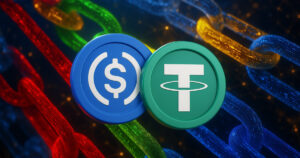Data Management with DePIN Technology
Data management is of the highest importance in today’s data-driven world, where security, transparency, and efficiency are key. Industries across various sectors, such as consumer insurance, media, advertising, and healthcare, are challenged to effectively manage large volumes of sensitive data while ensuring privacy and compliance.
Handling data across various sectors is exactly what Verida Network is trying to solve. Unlike traditional systems, Verida Network offers a decentralized infrastructure that ensures user data remains private, secure, and accessible only with consent.
This positions Verida to take advantage of the massive opportunities worth trillions of dollars. They can tap into the vast consumer insurance market valued at over $6 trillion, the lucrative media and advertising sector at $1.5 trillion, and the thriving health and pharmaceutical industry at $1 trillion.
Nevertheless, using this potential necessitates overcoming substantial obstacles in transitioning from Web2 to Web3 technologies. Verida Network is dedicated to providing the essential infrastructure needed to address these challenges.
Current Challenges in Web3 Adoption

Web3 technology is still in its early stages, and it still finds it hard to compete with Web2 alternatives due to its inefficiencies in developing feature-rich and strong applications. While the blockchain offers an Inter-Planetary File System (IPFS), there’s still the need for a new type of decentralized data storage infrastructure.
This new decentralized data storage infrastructure should be able to support identity, authentication, messaging, and personal data storage.
Furthermore, users and developers are already accustomed to the high performance, availability, and security Web2 offers. Thus, the Web3 sector needs a better technological stack that provides superior services than this, and decentralized storage networks such as Filecoin (based on IPFS), Sia, and Arweave can’t offer this.
Verida Network provides private encrypted databases and offers users control over where and how their data is stored. Furthermore, it supports real-time synchronization, permission data access, and client-side encryption. Subsequently, an ecosystem like this offers all the features needed for the Web3 sector to become better than the Web2 competition.

Verida is the Decentralized Solution for Private User Databases
Verida Network is a layer-zero decentralized public infrastructure (DePIN) ecosystem that combines user-controlled keys with the performance and privacy of traditional databases for complex dApps. It is not a blockchain network but a DePIN that offers privacy-preserving database storage for self-sovereign identities.
In other words, Verida Network was created to provide users with control over their data and how they choose to interact with the digital world.
Chris Were, CEO and co-founder at Verida, explained this vision:
“For years the world of crypto has been fixated on faster blockchains as the solution to mass adoption, when in reality the ability to handle personal data and combine it with crypto is the real secret.”

To achieve this, Verida Network employs many resources. First, they provide software SDKs to developers so they can integrate them into their applications to leverage the technical capabilities of the Verida protocol. Furthermore, Verida also offers open-source server nodes to any member of the public to provide storage capacity to the network and earn VDA tokens.
Innovative Features of Verida Wallet

Verida Wallet is one of the most strategic products of this project, and it functions simultaneously as a data wallet and as a crypto wallet. It is very innovative and has a user-friendly interface, which makes it possible for users to interact seamlessly with Verida protocol and other blockchains. The Verida Wallet comes with a lot of capabilities that make it very revolutionary in the crypto sector, and they include:
- Single Sign On: The single sign-on feature on Verida Wallet allows users to log in to multiple applications and websites with one set of credentials. Thus, they can interact with decentralized applications on the Verida Network using consensual authentication.
- Identity: One of the core functionalities of the Verida Wallet is that it provides an avenue to create decentralized identities in blockchain wallets and manage their private keys across different dApps.
- Sharing of Data: With this wallet, users can browse through their data and consensually share them. Moreover, Verida Wallet allows the receipt, storage, and sharing of W3C Verifiable Credentials. Furthermore, users don’t have to expose their private information due to the integration of Zero-Knowledge (ZK) credentials.
- Profiles and Inbox: This wallet also features an inbox and profiles. It provides private and public profiles that can be shared with third parties. Moreover, there’s an inbox feature that allows users to receive messages and requests.
- Tokens and Transactions: In addition to harboring a data wallet, the Verida Wallet allows users to sign transactions, transfer assets, and manage NFT while simultaneously earning Verida tokens.
Verida SDKs for Enhanced Development

The Verida SDK allows user data to be end-to-end encrypted with a private key on the user’s endpoint, preventing access from storage node operators and application developers. The Verida software development kits are mainly divided into SDKs for developers and clients.
The SDKs for developers help them create self-sovereign applications that leverage Verida Network to access smart contracts on supported blockchains. Moreover, they also have client SDKs that allow developers to build applications that access encrypted private storage, identity, and messaging capabilities. The client SDK is an easy-to-use library offering support for web browsers, React Native, and NodeJS applications.
Verida Token (VDA): The Ecosystem’s Lifeblood
The Verida Token (VDA) primarily facilitates payments, governance, transactions, and data storage on the platform. It plays a vital role in the creation of an ecosystem that allows secure interactions between accounts. In other words, the Verida Token facilitates secure data storage and trusted sharing among users.
The Verida Token has an economy of stakeholders, and this includes:
- End Users: The end users make payments for application and storage subscription fees on the Verida Network.
- Applications: The dApps on the Verida Network earn revenue from subscription fees. They can also generate valuable data and even help pay users’ storage fees.
- Storage node operators on the Verida Network can also stake the VDA token to earn an income.

According to their whitepaper, the original token name is Verida Utility Token (VDA), and it has a fixed supply of 1,000,000,000. The token distribution is quite fair. Verida growth rewards take 20% of the allocation at 200 million tokens. Verida DAO and project development take the same 20% of allocation each at a combined 400 million.
Following suit is the community reserve, which takes 15.4% of the allocation, and foundational supporters with 15.1% of the allocation. The remaining distribution includes the token launch, which takes 6%, and storage credits, which takes 3.5% of the allocation.
Diverse Use Cases for Verida Network
Verida Network has excellent and marvelous applications and use cases, which we will discuss below:
Credentials Management
One of the major applications of the Verida protocol is in credentials. It builds a mobile infrastructure that supports the latest and innovative identity and credential standards. Moreover, it offers data storage infrastructure that facilitates easy recovery and backup of these critical credentials.
Balancing AI Innovation and Privacy
One of the highlights of AI’s rise is that there should be a balance between the value of data for AI innovation and an individual’s fundamental right to privacy. Thus, Verida Network develops a realm of possibilities and a future that cultivates a balance between AI’s prosperity and its respect for data privacy.
Enhancing Healthcare Data Security
More than 130 million health records were stolen in the healthcare sector in 2023 alone. This highlights the need for secure, reliable, and scalable data management solutions in healthcare. Enter Verida Network, whose supercharged capabilities enable cross-border health data flows without compromising patient privacy. There is an actual application in Uzbekistan where Verida Network helps secure healthcare data.
Personalized User Experiences
One of the growing trends among consumers is the ever-burning need to receive customized experiences when accessing a product or service. Verida Network creates a realm of developer tools and a wallet interface, allowing users to receive unique experiences while protecting their data and privacy.
Chris Were said:
“Global commerce is driven by personal data. Product recommendations on Amazon from previous purchase history, Ads based on search history, Insurance based on where you live, the list goes on. Connecting payments with personal data is going to transform crypto and enable a wave of innovation rivalling what we have seen with introduction of he Internet.”

Verida’s Ecosystem of Partners
Kima Finance, Primacy, inDAO, WalletConnect, Veramo, Ten, Polygon ID, Synapse, zkpass, and Nillion are among the growing ecosystem of Verida’s partners. Moreover, Near Protocol and Gate.io, a crypto exchange with a daily trading volume of over $3 billion, are among their partners.
Besides their strategic partnerships, Verida Network is gaining massive online traction. It has more than 87,000 community members on Twitter and nearly 40,000 members on Discord. Moreover, it has more than 30 storage nodes and 50,000 identities deployed globally.
Links:
Website | Twitter | Discord | Telegram
Frequently Asked Questions
Disclaimer
This article is sponsored content and does not represent the views or opinions of BeInCrypto. While we adhere to the Trust Project guidelines for unbiased and transparent reporting, this content is created by a third party and is intended for promotional purposes. Readers are advised to verify information independently and consult with a professional before making decisions based on this sponsored content. Please note that our Terms and Conditions, Privacy Policy, and Disclaimers have been updated.








